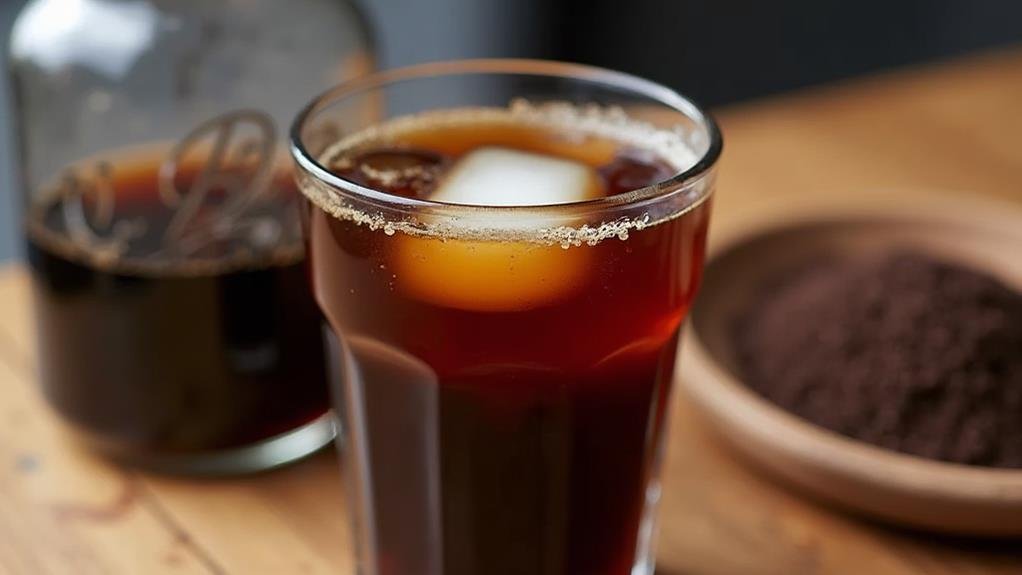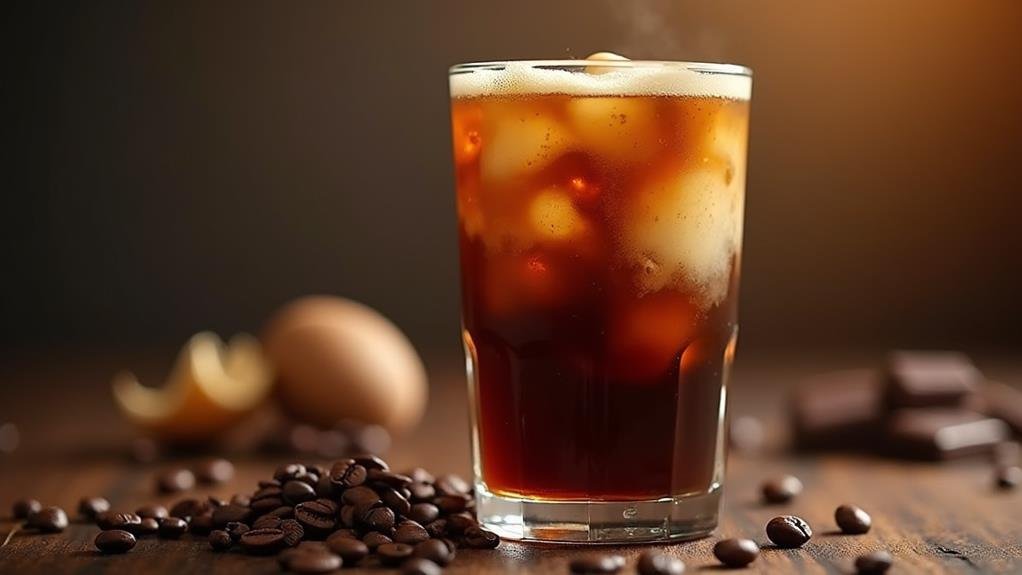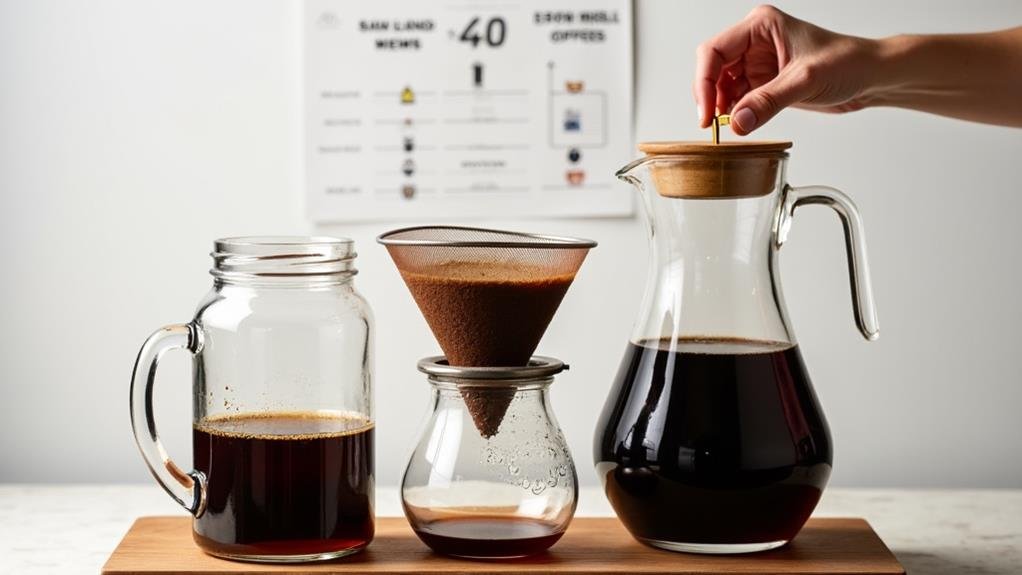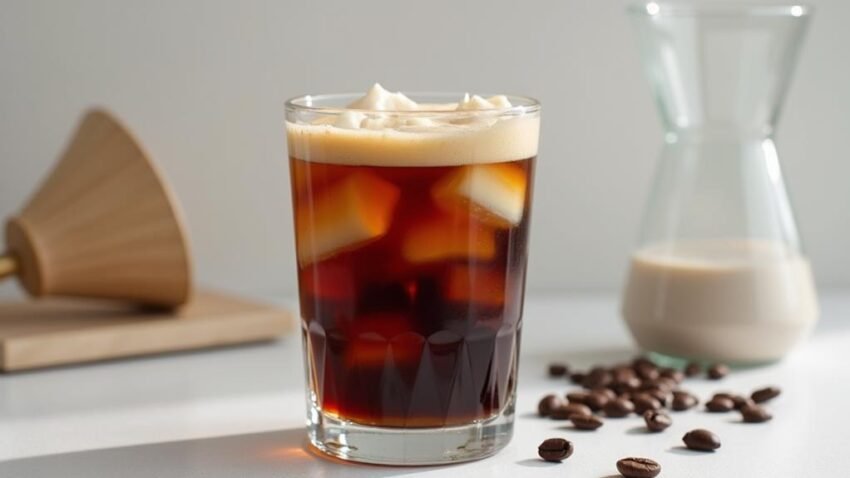If you're like me, you've probably heard of cold brew coffee but might not fully understand what sets it apart. Cold brew and hot-brewed coffee start with the same basic ingredients, but the brewing process is where the magic happens. By steeping coarsely ground coffee in cold water for 12 to 24 hours, cold brew delivers a smoother, less acidic taste with subtle nutty undertones. This prolonged steeping process transforms the flavor profile entirely, making it a favorite among those who appreciate a rich and bold cup. But what else makes cold brew so unique? Let's dive deeper to find out.
What Is Cold Brew?

Cold brew coffee is made by steeping coarsely ground coffee in cold water for an extended period, typically 12 to 24 hours. This slow and deliberate process results in a smoother, less acidic coffee with a mellow flavor profile and subtle nutty undertones. Unlike hot-brewed coffee, which can be quite harsh due to the rapid extraction of flavors, cold brew's prolonged steeping time ensures that the resulting coffee is gentle on the palate.
The concentrated coffee that comes from this method is strong and rich, making it ideal for those who prefer a robust cup. Because of the extended extraction time, cold brew contains more caffeine compared to traditional hot-brewed coffee, offering a significant caffeine boost. This concentrated brew can be diluted with water, milk, or cream to suit individual tastes.
Cold brew is perfect for hot summer days as it's served chilled or over ice, providing a revitalizing and flavorful coffee experience. Its smooth flavor profile and higher caffeine content make it a popular choice among coffee enthusiasts looking for a unique and invigorating beverage.
Whether you're new to coffee or a seasoned aficionado, cold brew's unique characteristics make it worth trying.
Cold Brew Vs Iced Coffee
When it comes to choosing an invigorating coffee drink, many of us find ourselves torn between cold brew and iced coffee. Understanding the differences between these two can help you make a more informed decision.
Cold brew coffee is made by steeping coffee grounds in cold water for 12-24 hours, which results in a smoother, less acidic flavor profile. This brewing process gives cold brew its mellow, chocolatey flavor with a velvety texture.
On the other hand, iced coffee is brewed hot and then poured over ice, offering a brighter taste with intense acidity and bitterness.
One key difference is the caffeine content: cold brew generally has a higher concentration of caffeine than iced coffee, making it a stronger option for those seeking a caffeine boost.
The water ratio and brewing process also influence the flavor profile; cold brew is less likely to become watered down compared to iced coffee, ensuring a consistent taste and longer shelf life when stored in the refrigerator.
Flavor and Acidity

After considering the differences between cold brew and iced coffee, it's clear that flavor and acidity are key factors to explore.
Cold brew coffee is known for its distinct flavor profile, which sets it apart from other types of coffee. Here are some key points about its flavor and acidity:
- Smooth Taste: Cold brew has a smoother taste compared to traditional hot-brewed coffee.
- Mellow and Aromatic: The slow steeping process results in a mellow and aromatic flavor.
- Velvety Texture: Cold brew often has a velvety texture that many find appealing.
- Nutty Undertones: It's also characterized by nutty undertones, adding depth to its rich flavor.
The lower acidity in cold brew makes it a gentle option for coffee drinkers who find traditional coffee too harsh. This lower acidity, combined with its bold and rich flavor, makes cold brew a popular choice among coffee enthusiasts.
Caffeine Content Comparison
The caffeine content of cold brew coffee is considerably higher than that of iced coffee, mainly due to the extended steeping process involved in its preparation. When you cold brew coffee, the grounds steep in water for a longer period, typically 12 to 24 hours. This prolonged steeping period allows for a more effective extraction of caffeine from the coffee grounds, resulting in a higher caffeine concentration.
In contrast, iced coffee's caffeine levels can vary significantly based on brewing methods and the type of coffee used. Iced coffee often involves brewing hot coffee and then chilling it, which may not extract as much caffeine from the grounds. Consequently, iced coffee generally has lower caffeine levels compared to cold brew.
For those seeking a potent caffeine boost, cold brew is often the preferred choice. The stronger caffeine profile in cold brewed coffee provides a more pronounced and sustained energy kick compared to iced coffee. This makes cold brews particularly appealing to individuals looking for a robust and lasting energy boost throughout their day.
Preparation and Cost

Preparing cold brew coffee involves a significant time commitment, unlike the quicker methods used for iced coffee. One of the key differences is the steeping time; cold brew requires 12 to 24 hours, which contrasts sharply with the rapid brewing process of iced coffee.
Here are some key points to ponder when it comes to the preparation and cost of cold brew:
- Steeping Time: Cold brew needs a much longer steeping time than iced coffee, which can range from 12 to 24 hours.
- Coffee Grounds: The preparation of cold brew requires a larger amount of coffee grounds compared to iced coffee.
- Cost: Due to the larger amount of coffee grounds needed, the cost of making cold brew can be higher.
- Shelf Life: While iced coffee needs to be consumed relatively quickly, cold brew offers convenience with a longer shelf life in the refrigerator.
The extended steeping time of cold brew allows for a smoother taste profile with nutty undertones, making it distinct from the flavor of iced coffee. However, this comes at a cost: cold brew is generally less budget-friendly for daily consumption compared to iced coffee, which is more economical.
Despite this, many find the unique taste and convenience of cold brew well worth the extra investment.
Serving Styles and Tips
When it comes to serving cold brew, you've got a lot of flexibility. One of the best things about cold brew coffee is that it can be served chilled or over ice without diluting its flavor, which makes it perfect for hot summer days. Unlike iced coffee, cold brew maintains its flavor integrity and doesn't become watered down, offering a invigorating and robust taste.
Cold brew can be enjoyed year-round, and its mellow, chocolatey flavor profile with a velvety texture makes it a favorite among coffee lovers. For an even richer coffee experience, consider using a French press to serve your cold brew. This method extracts more oils from the coffee grounds, enhancing the overall taste.
If you're looking for a unique twist, try adding cinnamon or clove to your cold brew for an extra depth of flavor. These spices complement the chocolatey notes beautifully and provide a delightful variation in serving styles. Whether you prefer it plain or with a spice, cold brew coffee is sure to satisfy your coffee cravings any time of the year.
Conclusion
To sum up, cold brew coffee offers a distinctive taste experience with its smooth, less acidic flavor and higher caffeine content compared to hot-brewed coffee. Its preparation technique guarantees a rich and mellow palate experience. Whether you're seeking a concentrated coffee drink or a invigorating beverage, cold brew is worth trying. By grasping its distinctions from iced coffee and its unique characteristics, you can value its versatility and savor it in different serving styles.

